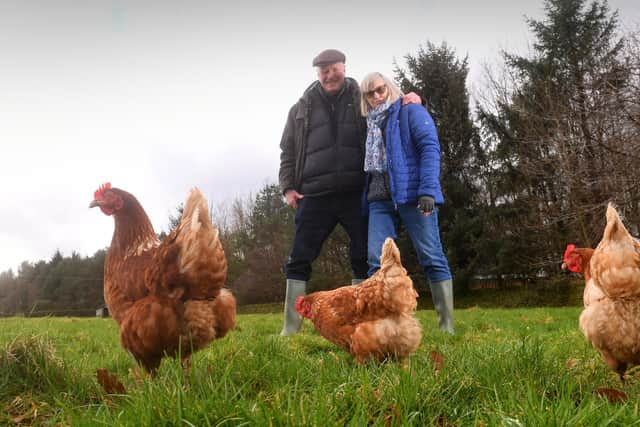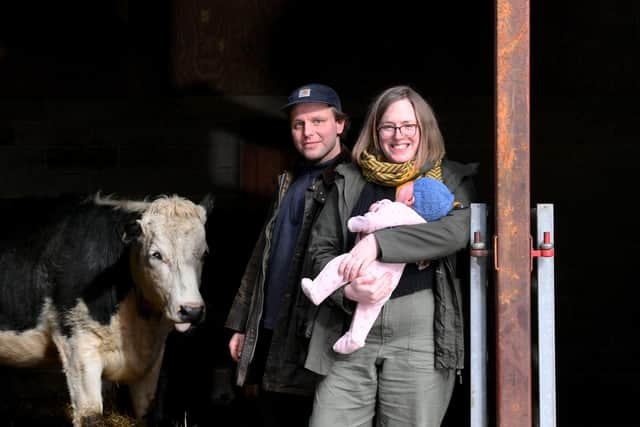How family built a holiday letting business from traditional farm in Last of the Summer Wine country
Steve Booth and his wife Alison have transformed the fortunes of Uppergate Farm in Hepworth since they focused on providing the best environment they could for holidaymakers.
“It was in the late 90s we started looking at why people would come to our part of West Yorkshire,” says Steve. “We’re in the South Pennines, just outside of Holmfirth, and Last of the Summer Wine was well known, an attraction that helped bring more tourism.
Advertisement
Hide AdAdvertisement
Hide Ad“Dad had realised the only way he was going to make a living from farming, following on from my granddad’s mixed farm enterprise, was to specialise and he went wholly dairy and at one time milked 120 Friesian cows but when dairying changed dad went over to beef cattle.


“I came back home when I was 30 and worked alongside dad on the farm while also carrying on my career in teaching and lecturing on finance and business management in colleges and universities. In the early 90s Alison and I renovated the then derelict 350-year old house next door that dad had bought for next to nothing and that’s where we live today.
This first act of renovation was the trigger for further renovation of another existing property on the farm, which was then let on a long-term basis, plus Steve and Alison started-up a bed and breakfast accommodation business from their house that was to lead to the family’s move more firmly into holiday accommodation and facilities.
“Dad was still keeping beef cattle at the time, and we had added a flock of free-range hens producing eggs. We had talked with him about doing farmhouse B&B and had renovated the other house because we knew that the size of the farm being what it was there was no way to make a living out of it.
Advertisement
Hide AdAdvertisement
Hide Ad“I was earning a decent wage away from the farm and Alison became busy at home doing the B&B. My dad passed away in 1998 and it was a short while later that we began to make the move towards where we have got to today.


“We had renovated a cottage that belonged to my cousin and uncle, we’d bought it, let it out and that’s when we wondered if holiday cottages would work? That’s when we had a good hard look at tourism development with mum and other members of the family and wrote a business plan which looked at converting some barns, at building some office space, playground, play shed and a swimming pool. It would be a big investment but it came out that it was necessary if we were looking at why people would specifically come here on holiday to this part of Yorkshire. The swimming pool gave us something unique here.
“Our conclusion was that before any large investment was to be made I was to keep on earning away from the home business. We knew the farmhouse B&B and a couple of conversions let as holiday lets was finite. You could only earn so much out of that, but our projection and investment that would need to be made over several years in the early 2000s showed there was a real viable business there, in more holiday let properties.
“We began building incrementally in the early 2000s. We had already started with the couple of farmhouse B&B rooms, we transferred the long-term let of the cottage let over to holiday let and renovated two more cottages, all as holiday lets. That’s when we sat down and thought how big can we could get and how big did we want to get.
Advertisement
Hide AdAdvertisement
Hide AdSteve’s background in finance and management meant he could put what he preached into practice and he began looking at what they would need to generate as a business to invest further and pay off the loans required.
“We moved into holiday cottage lets on a bigger scale. We had gone from farmhouse B&B to a few cottage lets. Our next was planning permission on an old listed barn into conversion for 4 bedrooms and at the same time we came up with the pool.
“We had the farm, albeit a lot smaller than it once was but with hens, a few pigs, calves and some sheep. It was a nice place for a family to come out in the countryside, but lots of places are like that. Very few have a swimming pool and a lovely village with historic buildings nearby and three pubs you can walk to in 10 minutes.
“We built the swimming pool in 2005, where the old milking parlour used to be.
Advertisement
Hide AdAdvertisement
Hide AdSteve says he no longer classes himself as a farmer, but that his daughter Claire and son-in-law Klavs are keen to start a small pig herd of Large Blacks.
“We’ve still got animals to feed and tend and our guests love coming because of them. We have a few beef cattle, sheep and pigs. We part-butcher ourselves and sell pork, beef and lamb to holiday guests, people we know, and we have knocking on 100 free range hens producing eggs daily.
“The calves come from a dairy herd, we have Kune Kune and Mangalitza pigs that we run in the woods. Klavs does charcuterie. I’m first on the list for a few cade lambs to feed.
Uppergate Farm has also embraced the glamping side, another area that Steve says has not slowed up at all.
“We have been into it 10 years and have stayed very busy. It’s all very different from my youth when we always talked about how many muck heaps you could see as you walked through the village.
Comment Guidelines
National World encourages reader discussion on our stories. User feedback, insights and back-and-forth exchanges add a rich layer of context to reporting. Please review our Community Guidelines before commenting.